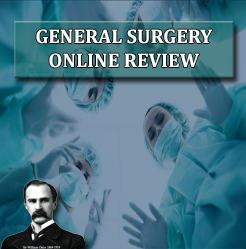
Osler General Surgery 2019 Online Review (Videos)
$35.00
Format: 50 Videos + 5 PDFs
Category: CME Videos General Surgery Videos/Audios
published date: 01 Jan 21

$35.00
Format: 50 Videos + 5 PDFs
Category: CME Videos General Surgery Videos/Audios
published date: 01 Jan 21
This comprehensive review is designed to update your clinical knowledge-base as well as to help you pass your General Surgery exams. Emphasis is on evidence-based medicine and board-relevant standards of care, incorporating current best practice concepts, surgical approaches, and clinical follow-up strategies. As a result, it provides a good review for your ABS written exams as well as providing a thorough general surgery review for physicians in practice. Many previous learners have found the course provided them with improved diagnostic and planning strategies, a better understanding of the best surgical approaches for the principle areas covered by general surgeons, and helped them recognize areas of weakness for self-study.
Objectives
At the conclusion of this course each participant will be able to:
- Summarize the basic science fundamentals underlying patient management as applied to general surgery.
- Describe preoperative, operative and postoperative patient care in the principle component areas of general surgery: specifically diseases of the head and neck, breast, skin and soft tissues, alimentary tract, abdomen, vascular system, endocrine system, comprehensive trauma management and emergency operations, and surgical critical care.
- Discuss the principles of and perioperative patient care in the surgical specialties of cardiothoracic surgery, pediatric surgery and transplant surgery.
- Summarize the clinical care of patients with common problems in urology, gynecology, orthopedics, and burns.
- Demonstrate an understanding of tumor staging and describe the appropriate surgical and/or nonsurgical management required.
- Discuss non-operative management options for general surgery patients which may not require surgical intervention (e.g., patients with pancreatitis, portal hypertension, immunosuppression, multiple traumas).
- Outline the appropriate use of newer diagnostic and therapeutic methods such as: laser-based applications; stereotactic breast biopsy; physiologic testing and evaluation of the GI tract; noninvasive vascular system diagnostic evaluation and invasive vascular interventional techniques; ultrasonography of the head and neck, breast and abdomen; and endorectal ultrasound.
* Thyroid Surgery, Parathyroid Surgery, Adrenal Surgery, Multiple Endocrine Neoplasia
Release Date: August 20, 2019